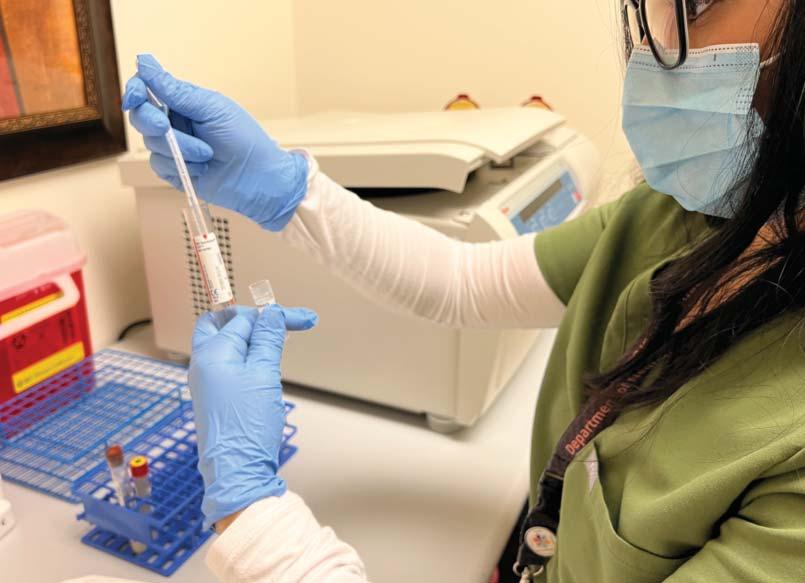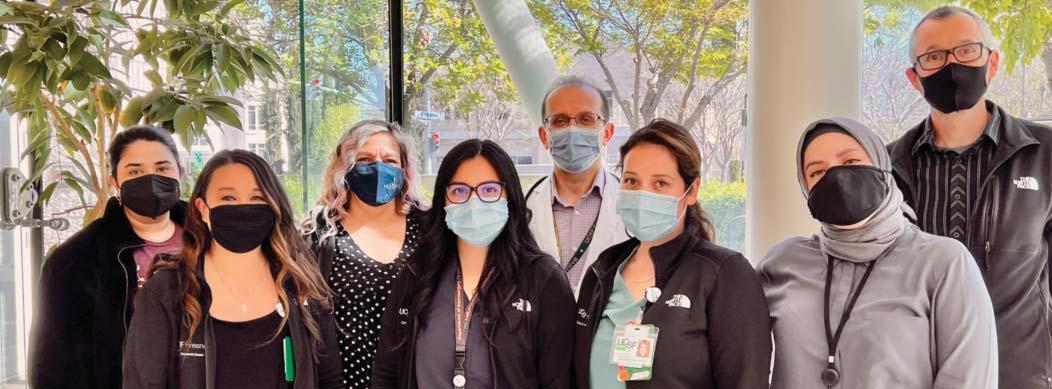
5 minute read
Research
Research Activity at UCSF Fresno Increased Six-Fold Since 2019
By Barbara Anderson, UCSF Fresno Communications
Advertisement
UCSF Fresno successfully led a fundraising effort 10 years ago to establish the UCSF Fresno Clinical Research Center, bringing together support staff and the Assistant Dean for Research at the UCSF Fresno building. A decade later, the Center has grown into a hub for clinical research in the San Joaquin Valley and is recognized for innovative trials, including several that have contributed to new treatments for COVID-19.
“This Center has become increasingly important as our region was ravaged by the COVID-19 pandemic,” said Michael W. Peterson, MD, associate dean for Undergraduate Medical Education and Research at UCSF Fresno. “In December 2019, we, along with medical communities around the world were suddenly confronted with a new disease unlike any we had seen for 100 years. We had no diagnostic tools, no treatment guidelines, no vaccines, and no treatments,” Dr. Peterson said. “In very short order, our UCSF Fresno clinical leaders came together to both initiate novel studies and become important contributing participants in many national multicenter studies to help us learn how to manage this new disease.”
UCSF Fresno research has led and continues to contribute to important new knowledge on managing this disease, and during these two years the mortality rate for patients with the infection has steadily decreased, Dr. Peterson said. “Patients in the region had access to new and important treatments through research protocols that were not available to the public.”
At the same time, the scope of research at the Center continues to expand far beyond COVID-19. Currently, UCSF faculty at the Fresno regional campus are overseeing 50 studies and clinical trials in various stages of progress.
“Our research activity has probably increased six-fold compared from 2019 to 2022,” said UCSF Fresno Assistant Dean of Research Eyad Almasri. “We have transitioned from COVID-19, from almost 90% COVID studies and 10% non-COVID, to probably 50% COVID and 50% non-COVID today,” he said. “We are a clinical research center for everyone, including Surgery, Emergency Medicine, Family and Community Medicine, Pediatrics, Psychiatry, Obstetrics/Gynecology, Internal Medicine, Orthopaedic Surgery and Oral and Maxillofacial Surgery.”
Vascular surgeons in the UCSF Fresno Department of Surgery, for example, are conducting four clinical trials currently – three are post-market studies and one is a non-FDA approved device investigation of a bio-absorbable scaffold for placement below the knee in patients with chronic limb threatening ischemia. The device could afford significant benefit to vascular patients at risk of below-theknee amputation.
The device is currently experimental. UCSF Fresno is one of about two dozen sites in the United States participating in the Abbott LIFE-BTK clinical trial. “This is an exciting technology that hopefully can be brought to the United States to improve patient care and decrease limb loss,” said Leigh Ann O’Banion, MD, UCSF Fresno vascular surgeon and UCSF assistant clinical professor who serves as the site principal investigator for UCSF Fresno.
Sammy Siada, DO, a UCSF Fresno vascular surgeon and UCSF assistant clinical professor, is a sub-investigator for the LIFE-BTK study and is a site principal investigator for a multicenter study of an FDA-approved stent graft device for the repair of abdominal aortic aneurysms. An abdominal aortic aneurysm occurs when the abdominal aortic wall becomes weakened, resulting in a bulging of the blood vessel. It is a life-threatening diagnosis and patients who meet anatomic criteria are consented and enrolled in the trial to monitor the long-term outcomes of the new stent graft technology. UCSF Fresno is one of a few dozen institutions worldwide selected by the device manufacturer to participate in this study.
The UCSF Fresno Clinical Research Center provides the infrastructure for faculty participation in clinical trials, Dr. Siada said. “We’re contributing to science, which hopefully will ultimately lead to the betterment of our patients in the long run, which is the ultimate goal as always.”
Research to improve health and well-being in Central California is a priority of UCSF Fresno. Physicians are encouraged to investigate health conditions specific to the region, as well as clinical trials of novel treatments for patients. The support of the UCSF Fresno Clinical Research Center is critical for this mission, said Dr. Almasri, who last year was appointed Assistant Dean of Research to oversee the Center. “When it comes to research involving patients –actual patients, the Clinical Research Center somehow, some way or another, will be needed,” he said.
UCSF Fresno has hired more staff for the Center to facilitate the increase in research projects being conducted by UCSF Fresno physicians. Most recently, it has added a research pharmacist who works with pharmacy technicians at the center. Having a research pharmacist allows outpatient medications to be stored, as well as dispensed, at the Center. Prior to the research pharmacist, both inpatient and outpatient drugs for clinical trials had to be stored at the Investigational Drug Service at Community Regional Medical Center.
UCSF Fresno Research Team
The Center also has added six research coordinators, for a total of eight and doubled the number of research assistants from two to four. “When you have enough people to do the work, you are a lot more efficient and able to concentrate more on your projects and be successful,” said Rebekah Garcia, CCRP, Clinical Research supervisor and interim Clinical Research manager. Research coordinators work with physicians from the initiation of a research project to its culmination. The coordinator helps prepare paperwork for a project proposal, serves as liaison between the researcher and the Institutional Review Board (IRB) for project approval, acts as the liaison between the researcher and a study sponsor, obtains patient consents, enrolls patients in studies, screens patients, schedules follow-up visits with patients and records research findings.
“There is a lot of work that they do in the background,” said Vijay Balasubramanian, MD, a UCSF Fresno pulmonary specialist and UCSF clinical professor. He has led about 18 clinical trials over the past several years with support of the Clinical Research Center. Dr. Balasubramanian, who is the medical director of a nationally acclaimed Pulmonary Hypertension program at UCSF Fresno, has three trials currently in process.
These clinical trials provide the unique opportunity to our Central Valley patients to benefit from cutting edge therapies that treat difficult and complex diseases such as Pulmonary Hypertension, Dr. Balasubramanian said. “These are not just people to enter data,” Dr. Almasri said of the Clinical Research Center staff members. “You’re talking about daily screening, recruiting, consenting, enrolling. It’s arranging for follow-up. Sometimes they are doing home visits to take blood. Their intervention with someone enrolled in a study can be for only a day or two or the follow-up can be for 18 months or longer.”
The Clinical Research Center is an invaluable resource for physicians who want to conduct and participate in clinical trials, and with a bigger staff the Center can respond to more requests for assistance, Dr. Almasri said. Clinical research is an expensive undertaking and securing funding is an ongoing effort but supporting physicians’ research projects is a responsibility UCSF Fresno takes seriously. “Research is part of our mission at UCSF Fresno.”











